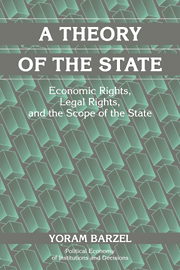Book contents
- Frontmatter
- Contents
- Preface
- 1 Introduction
- I The Emergence of Protection and Third-Party Enforcement
- II The Emergence of Legal Institutions
- III The Character of the State
- 12 Merger and Local Autonomy
- 13 The Distinction between “Legitimate” and “Criminal” States
- 14 Power, Violent Conflict, and Political Evolution
- 15 The Time Path of Change under Dictatorships and under Rule-of-Law Regimes
- 16 Recapitulation and an Epilogue
- References
- Index
- Other Books in the Series
12 - Merger and Local Autonomy
Published online by Cambridge University Press: 04 December 2009
- Frontmatter
- Contents
- Preface
- 1 Introduction
- I The Emergence of Protection and Third-Party Enforcement
- II The Emergence of Legal Institutions
- III The Character of the State
- 12 Merger and Local Autonomy
- 13 The Distinction between “Legitimate” and “Criminal” States
- 14 Power, Violent Conflict, and Political Evolution
- 15 The Time Path of Change under Dictatorships and under Rule-of-Law Regimes
- 16 Recapitulation and an Epilogue
- References
- Index
- Other Books in the Series
Summary
In this and the next three chapters I discuss four topics that will elucidate the character of the state and promote further understanding. The order of these chapters is arbitrary. They concern problems that earlier chapters raised indirectly, but were not integral parts there. I begin with autonomy and merger.
It appears that small states should be able to avoid being captured by, and forced to pay tribute to, larger ones by voluntarily merging in order to mount a unified defense. Yet historical examples of voluntary merger are few. In this chapter, I argue that the prevailing ideas related to the advantages of merger are ill-conceived. I then explore conditions leading to merger, concluding that considerations of trade and its enforcement, not cooperation for military defense, are the factors that drive merger agreements.
WHY POOLING MILITARY STRENGTH IS INSUFFICIENT TO EXPLAIN MERGER
Individually, small states make tempting prey for larger, more powerful states. The combined military powers of small neighboring states, however, may exceed that of a threatening large state. The small states can do well if they can pool their forces. If merger between states were easy to arrange, it would be of great value. Cooperation, however, is always problematic; each party can gain the most from the cooperative enterprise by keeping its own contribution to a minimum. This difficulty is relevant to the pooling of military forces. Agreements among states must be self-enforced, and the temptation for a free ride is bound to be strong. One method of reducing the chance of a free ride is by merger, where the individual states submit to the combined power of the newly merged state.
- Type
- Chapter
- Information
- A Theory of the StateEconomic Rights, Legal Rights, and the Scope of the State, pp. 217 - 227Publisher: Cambridge University PressPrint publication year: 2001

